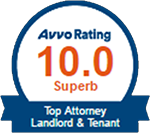In today’s internet age, there are legal Do-It-Yourself guides and websites everywhere. However, when it comes to commercial real estate leasing, don’t do it yourself. Renting commercial space is a big responsibility. While there are commercial lease forms everywhere, commercial leases should be tailored to meet the individual’s needs. As such, there should be more negotiation between the landlord and the tenant. Ultimately, trying to “do it yourself” could cost you more than you bargained for.
There are different types of commercial leases, with each containing numerous terms and conditions and specifically customized for different types of properties (retail lease, store lease, office lease and industrial lease). In this newsletter, we will provide a broad overview of commercial leases.
What is a commercial lease?
A commercial lease is a contract between a landlord and tenant that lays out the parties’ rights and responsibilities, as well as the property being leased and what it is being leased for. Each commercial lease is complex and contains many terms that address the various rights and obligations of the landlord and the tenant. Some of the major terms found in a commercial leases are the following:
- Rent (how much money?)
- Additional rent (real estate taxes, common area maintenance, water, late fees)
- Security Deposit
- Term of lease (amount of time)
- Guaranty (is the tenant personally guaranteeing the lease)
- Use of the property (what can the property be used for?)
- Certificate of occupancy and zoning
- Alterations
Considerations before signing a lease
As a tenant, the type of business will dictate the type of property being rented: a restaurant/café will require a retail store front space; a metal fabrication shop will require industrial space; an investment firm or tech start-up will require office space. Regardless of the type of space being rented, consider whether the property will meet the needs of the business, the property will support future growth of the business, and that the specific use is allowed under local zoning laws. For a landlord, make sure the obligations are on the tenant.
Common important terms of a commercial lease
a. The length and cost of a lease:
All commercial leases set forth the length of the lease, how much rent will be paid, what additional rent the tenant is responsible for, and the amount of security to be held by the landlord. When considering the bottom line (what is the total monthly cost for the commercial space), one should look at the not only the rent being paid, but also if there are additional payments for real estate taxes, maintenance for common areas, water and/or late fees. In addition, consider if the rent will increase over the term of the lease, and if so, by how much. The tenant is also required to deposit security with the landlord and a landlord will want to make sure they get as much of a security deposit as possible.
b. The Guaranty:
Most commercial leases contain a personal guaranty and it is one of the most important components of a commercial lease. A personal guarantee is where an individual agrees to personally guarantee that the lease terms will be fulfilled. The individual signing the personal guaranty (the “guarantor”) is personally liable to the landlord for rent and other obligations of the tenant in the event the tenant fails to comply with the lease. There are different types of guaranties. Signing a personal guaranty could have dire consequences for the guarantor – personal home could be at risk and bank accounts and assets could be frozen. On the other hand, a guaranty is good for a landlord because it allows the landlord to look beyond the limited liability of a corporation or LLC in the event the tenant defaults. In either circumstances, a personal guaranty should not be signed without consulting with an attorney.
c. Use and zoning:
The type of use permitted at the property is also important. Both the landlord and the tenant should ensure that the proposed use of the commercial real estate is allowed under applicable law and regulations. The building’s certificate of occupancy, along with local zoning regulations will determine what uses are permitted. Before even signing a lease, it is recommended that the proposed use be discussed with a local attorney to determine whether a specific use is permitted, and if not, how the use may be changed. The lease should also address who will be responsible for making such changes.
d. Alterations:
Typically, the commercial space may need complete renovation or a build out to suit the tenant’s needs. Prior to signing the lease, the landlord and the tenant should agree to the work that is to be completed so all parties are on the same page as to what work is to be completed and you decrease the chance for a dispute to arise. Both the landlord and the tenant should also agree to the amount of time needed to hire an architect, plan the build out, obtain permits, complete the build out, and get final approvals from the building department.
We are here to help
Whether you are a landlord or a tenant, commercial leases include liabilities, risks and obligations. The terms discussed above are just a few of many terms that appear in a commercial lease. A commercial lease is a voluminous and complex legal contract that should be drafted and/or reviewed by an attorney. It is important that you invest the time and resources up front to ensure that you are adequately protected. Therefore, it is critical that you have legal representation. We will work with you to understand your needs and goals, and so that you fully understand your rights, responsibilities and obligations under the commercial lease. We will negotiate the terms and will work with the other side in finalizing the lease to ensure you obtain the most fair and favorable terms, and the commercial lease is clear so as to prevent disputes.
Practicing real estate, both commercial and residential, for over 20 years, James G. Dibbini & Associates, P.C. has the experience, knowledge, and know-how to navigate you through the complicated and overwhelming process of negotiating and executing a commercial real estate lease. If you need representation for a commercial lease, or you have any questions regarding a commercial lease, let us help you. Give us a call at (914) 965-1011 or email us at jdibbini@dibbinilaw.com to schedule a consultation.
This James G. Dibbini & Associates, P.C. Newsletter is a publication of James G. Dibbini & Associates, P.C. All Rights Reserved. Quotation with attribution is permitted. This newsletter offers general information and should not be taken or used as legal advice for specific situations, which depend on the evaluation of precise factual circumstances. Please note that James G. Dibbini & Associates, P.C. does not undertake to update its publications after their publication date to reflect subsequent developments. Prior results do not guarantee a similar out- come. This publication may contain attorney advertising.






